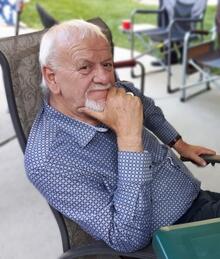This article was originally published on the Faculty of Science's website.

Mayfield joined the University of Waterloo in 1970 after completing his graduate studies at the University of Liverpool, UK and a post-doctoral fellowship at McGill. He worked at the University of Waterloo for more than 34 years and served as Associate Dean of Computing in the Faculty of Science for eight years.
"Colin was a wonderful, caring colleague, who had a true interest in others and was always willing to use his talents to help them," said Professor Emeritus John Thompson. "It was a privilege and honour to work with him."
His passion for learning, innate curiosity in biology and technology fuelled his diverse research interests and successful career. He had an H-index of 33 and published more than 160 academic papers.
His research began in soil microbiology and then moved onto soil nitrogen, aquatic microbiology and toxicology. That interest included bioremediation and groundwater microbiology. Later in his career he worked in the fields of information technology, environmental software development and cooperative projects in data management, sharing and application.
He noticed it was the lack of mechanisms to find and use environmental data and information that blocked progress in that sector, not just the lack of information. Government, industry and academia weren't able to find, share and use existing data on environmental issues. This insight shifted his interests and research towards environmental information systems.
Mayfield taught 74 graduate students during his career. He believed in the research potential of students, regardless of the strength of their transcript. That belief gave Joan Torrie the opportunity to pursue graduate work. Out of gratitude she developed the Waterloo Pioneers of Microbiology Award to honour those early faculty and pay it forward to an incoming students who may overlooked during the conventional scholarship and award selection processes.
"Colin's reputation as a graduate studies supervisor was notable in that many of his students felt he had faith in their ability to grow and contribute to science and that any path was open to them," said Karen Trevors, Executive Officer, Dean of Science. "He built a strong cohort of students who were supportive and loyal to one another and successful in academia, consulting, and entrepreneurial ventures."
He taught two undergraduate microbiology courses - Environmental Microbiology (Biol 447), which studies the environmental impact of microorganisms and Current Topics in Applied Microbiology (Biol 475) which explores and analyzes current topics in microbiology.
"Very nice prof, always on time for lectures, very knowledgeable in his field, can provide numerous examples and stories during class," Biol 447 student. "He dresses really well too. Also, not too many profs are as computer literate as him!"
Mayfield was a founding member and Assistant Director of the United Nations University Institute for Water, Environment and Health (UNU-INWEH), headquartered at McMaster University and the Canada Centre for Inland Waters (CCIW), Burlington, ON. Among the work he led was the Water Virtual Learning Centre for distance education on integrated water resources management (IWRM) delivered in developing countries in Asia, Africa, the Middle East and Central America.
Outside of academia, Mayfield had a passion for cars and motorcycles. He enjoyed restoring them. He was also an enthusiastic amateur photographer and videographer.
A man of reason, scientific principles, and fairness. Mayfield's youthful vibe, high intelligence, grace, attentive listening, compassion, and delightful sense of humour set him apart. He led by example for the betterment of others. He knew what he wanted and made it happen. He never stopped thinking, and when compelled spoke up. Colin will be deeply missed.
We extend our deepest sympathies to Professor Mayfield’s family and friends. Share online condolences and memories of Professor Mayfield on the memorial website.